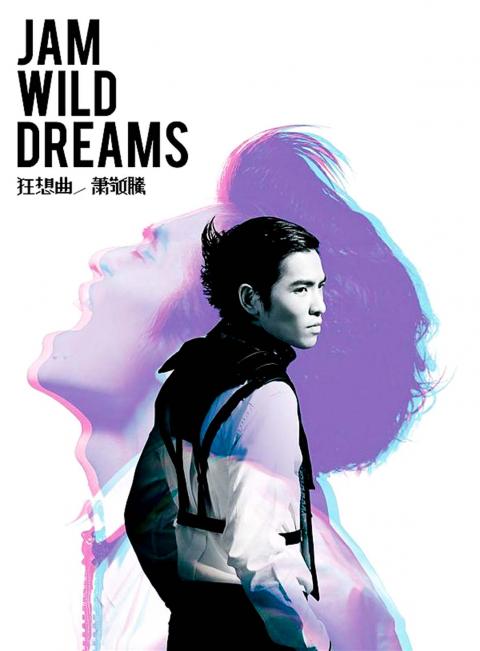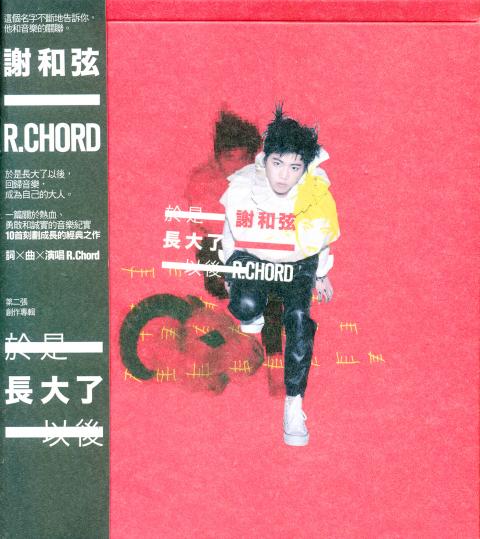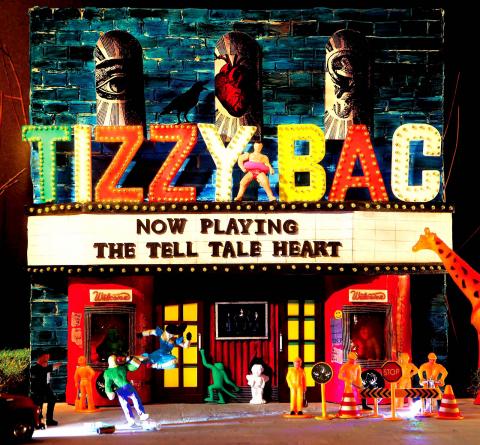It’s no wonder that Jam Hsiao (蕭敬騰) has emerged as the most successful of the One Million Star (超級星光大道) clan. The contrast between his soaring, explosive vocals and his taciturn manner — on top of a waifish physique — makes him a memorable and charismatic pop personality.
Serving as his own producer and delivering four self-penned songs on his fourth full-length album, Wild Dreams (狂想曲), Hsiao proves that he has the all-around talent to sustain a long career.
Whereas other singer hopefuls aspire to deliver the most polished sounds possible, Hsiao has enough confidence in his vocal chops to showcase his voice in all its imperfect but spontaneous glory.

The lead single Wild Dreams is an innovative pop anthem that aims for an outlandish rock/classical fusion by blending rolling guitar chords with 100-piece orchestra sessions.
The second single, Miss You Forever (只能想念你), written and produced by Mando-pop love goddess Tanya Chua (蔡健雅), showcases Hsiao in a rarely seen laid-back mode. Delivering this acoustic love ode with relaxed vocals, he proves that over-singing is not the only trick up his sleeve.
The real brow-raiser comes at the end of this 14-track set, where Hsiao shows off his burgeoning talent as a songwriter with four songs written for movies and commercials. I Really Want to Say (好想對你說), the theme song to Hsiao’s film debut in The Killer Who Never Kills (殺手歐陽盆栽), is a conventional Mando-pop ballad with just enough catchiness.

Defying its literary namesake, Tale of the White Snake (白蛇傳) reveals itself to be a high-octane rock number that flaunts Hsiao’s piercing vocals. With Jasmine Love (茉莉戀), Hsiao uses a lilting guitar chord to conjure up a pastoral love ode in the vein of Teresa Teng’s (鄧麗君) Hsiaotiao (小調). Love at First Sight (看對眼) is a pop ballad in which Hsiao switches gears between folk earnestness and rock edginess.
Wild Dreams showcases how amazingly versatile Hsiao is as a singer, able to conquer the various sub genres of Mando-pop and deliver every format with intelligence and subtlety, while still managing to put his personal stamp on them.

— BY ANDREW C.C. HUANG
R.Chord (aka Hsie He-hsian, 謝和弦), who received a best newcomer Golden Melody nomination for his debut album Nothing but a Chord (雖然很芭樂) last year, recently released his much anticipated follow-up, So After I’ve Grown Up (於是長大了以後).
Writing all 10 tracks on the album, R.Chord proves just how good a melodic songwriter he is by serving out abundance of contagious pop gems. Juggling R ’n’ B, hip-hop, rock and jazz, R.Chord grapples with post-adolescence uncertainty in a musically complex album that’s at once charming and envelope-pushing.
The title track wrestles with an early adulthood crisis by blending Mandarin and Hoklo (commonly known as Taiwanese) in a polished R ’n’ B gem.
With Under the Willow Tree (柳樹下), R.Chord pays tribute to the Bobby Chen (陳昇) classic One Night in Beijing (北京一夜) by juxtaposing rapping with Beijing opera-style vocal segments.
R.Chord’s labelmate Lala Hsu (aka Hsu Chia-ying, 徐佳瑩) shows brow-raising versatility by performing the chorus section in a quasi-Beijing opera vocal style.
Another highlight arrives with the help of rapper Soft Lipa (蛋堡), who lends his trademark jazz/hip-hop fusion sound to the contagious ballad Crazy for U. Taking a cue from Soft Lipa, R.Chord shakes off his usual callowness to conjure up coquettish verve in a come-on gem inspired by big band sound.
R.Chord flirts with rock in Sea (海洋), makes a nod to retro disco with Dream Girl (夢幻女郎), and forays into acoustic folk for I Won’t Disappoint You (我不會讓你失望).
Although the eternally boyish rocker’s post-adolescent anxiety seems belated at 24, he pulls it off. R.Chord’s multi-lingual R ’n’ B pegs him as a rival to prodigy Hsiao Hung-jen (蕭閎仁). With Mando-pop heavyweights such as Wang Lee-hom (王力宏) and David Tao (陶喆) moving into their late 30s, all eyes will be on rising stars such as R.Chord and Hsiao to usher in the next generation of Mando-pop R ’n’ B.
— BY ANDREW C.C. HUANG
If one indie rock band is tilting mainstream tastes away from Mando-pop, it’s Tizzy Bac. The trio’s music is imaginative but not overly self-indulgent, and strives for a Beatlesque elegance. This is coupled with the beguiling voice of singer and pianist Chen Hui-ting (陳惠婷), who tugs at the heart strings without resorting to saccharine cliches.
The Tell Tale Heart (告密的心), the group’s fourth release, is Tizzy Bac’s best, and sees the band taking their sound to a new level. Part of this has to do with higher production values, but most notably the songwriting has matured.
Fans will be familiar with the piano-driven pop mixed with prog-rock on songs like Open Fracture (開放性骨折) and Sunday Afternoon Housewives Hour (周日午後的婦女時間), but the arrangements feel tighter and flow well; the band sounds more confident and self-assured than ever. Every Dog Has Its Lawn, despite the somewhat unintelligible English lyrics, is simply a great pop song.
It also sounds like the band has become more comfortable in the studio, evidenced by more bold experimentation with the instruments (mostly on the synthesizers) and song forms. Forget and Drop (忘記丟掉) gives a big nod to the post-punk/revival 1980s pop stylings of Broken Social Scene, with Chen’s normally sweet, crystalline voice wrapped in a thin gauze of distortion, and an ambient groove in the background.
On I Don’t Want to Sleep Alone (我不想一個人睡), Chen combines a funky 1970s tone from a Rhodes organ with a barrage of in-your-face synth noise that swells on top of a disco beat. Not Even Close (to Love) begins as a bittersweet, bluesy ballad and ends with a noisy, high-pitched synth melody that has a jarring effect yet gives the song a ragged beauty.
Tizzy Bac is fond of concept albums. Their last release, If I See Hell I Won’t Fear the Devil (如果看見地獄,我就不怕魔鬼) was loosely based around the fears of a 10-year-old child. The Tell Tale Heart appears to be inspired by Sigmund Freud, as the CD liner notes include his famous quote: “No mortal can keep a secret. If the lips are silent, he chatters with his fingertips; betrayal oozes out of him at every pore.”
The album is divided into two halves: The first seven tracks are about dreams; the second half is marked by the instrumental interlude Dream Is Over. If there’s an important theme or message in the music, it’s not immediately apparent, but that’s part of Tizzy Bac’s charm.
— BY DAVID CHEN

Under pressure, President William Lai (賴清德) has enacted his first cabinet reshuffle. Whether it will be enough to staunch the bleeding remains to be seen. Cabinet members in the Executive Yuan almost always end up as sacrificial lambs, especially those appointed early in a president’s term. When presidents are under pressure, the cabinet is reshuffled. This is not unique to any party or president; this is the custom. This is the case in many democracies, especially parliamentary ones. In Taiwan, constitutionally the president presides over the heads of the five branches of government, each of which is confusingly translated as “president”

Sept. 1 to Sept. 7 In 1899, Kozaburo Hirai became the first documented Japanese to wed a Taiwanese under colonial rule. The soldier was partly motivated by the government’s policy of assimilating the Taiwanese population through intermarriage. While his friends and family disapproved and even mocked him, the marriage endured. By 1930, when his story appeared in Tales of Virtuous Deeds in Taiwan, Hirai had settled in his wife’s rural Changhua hometown, farming the land and integrating into local society. Similarly, Aiko Fujii, who married into the prominent Wufeng Lin Family (霧峰林家) in 1927, quickly learned Hoklo (commonly known as Taiwanese) and

The low voter turnout for the referendum on Aug. 23 shows that many Taiwanese are apathetic about nuclear energy, but there are long-term energy stakes involved that the public needs to grasp Taiwan faces an energy trilemma: soaring AI-driven demand, pressure to cut carbon and reliance on fragile fuel imports. But the nuclear referendum on Aug. 23 showed how little this registered with voters, many of whom neither see the long game nor grasp the stakes. Volunteer referendum worker Vivian Chen (陳薇安) put it bluntly: “I’ve seen many people asking what they’re voting for when they arrive to vote. They cast their vote without even doing any research.” Imagine Taiwanese voters invited to a poker table. The bet looked simple — yes or no — yet most never showed. More than two-thirds of those

In the run-up to the referendum on re-opening Pingtung County’s Ma-anshan Nuclear Power Plant last month, the media inundated us with explainers. A favorite factoid of the international media, endlessly recycled, was that Taiwan has no energy reserves for a blockade, thus necessitating re-opening the nuclear plants. As presented by the Chinese-language CommonWealth Magazine, it runs: “According to the US Department of Commerce International Trade Administration, 97.73 percent of Taiwan’s energy is imported, and estimates are that Taiwan has only 11 days of reserves available in the event of a blockade.” This factoid is not an outright lie — that